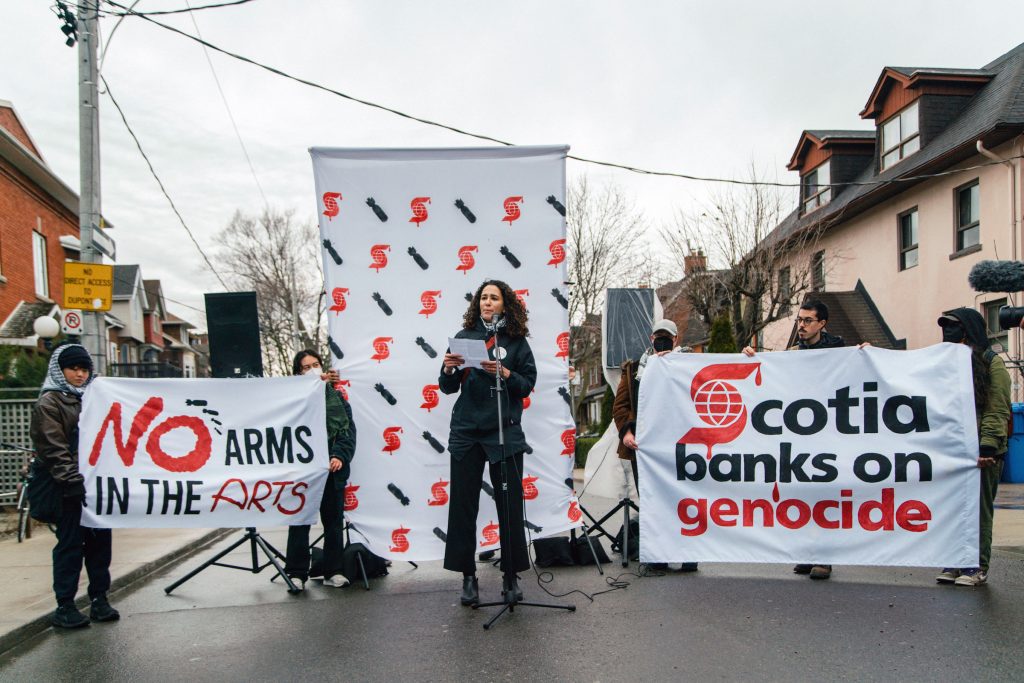Toronto filmmakers, artists and writers are campaigning to divest arts funder Scotiabank from Israeli arms manufacturer Elbit Systems. Today, March 26, a coalition of activists announced the launch of “No Arms in the Arts,” an effort targeting programs sponsored by Canada’s financial institutions, including the Hot Docs Film Festival, Contact Photography Festival, Scotiabank Giller Prize. , and the Toronto Art Biennial.
The campaign was launched by members of Film Workers for Palestine, Writers Against the War on Gaza, Artists Against Artwashing and CanLit Responds. today Around the corner from the Hot Docs cinema. As organizers of the Hot Docs festival announced the film lineup for this year’s edition, which runs from April 25 to May 5, dozens of protesters waved Palestinian flags and carried placards reading “Scotia Banks on Genocide” at a counter press conference, criticizing Hot Docs’ criticism. Scotiabank’s funding and the festival’s alleged silence in the face of Israel’s bombing of Gaza.
Scotiabank is now the largest foreign shareholder of Elbit Systems, Israel’s largest arms company, which has been frequently targeted by pro-Palestinian protesters. “No Arms in the Arts” follows numerous protests at the offices of Scotiabank and Elbit Systems, as well as a demonstration that disrupted the Giller Prize ceremony in November.

In recent months, Israeli military attacks have killed more than 31,819 Palestinians in the Gaza Strip, as well as 382 Palestinians in the West Bank, according to the United Nations.
“Our organizations are of great value to Scotiabank. We’re asking them to use their position as partners to tell Scotiabank they can’t invest in genocide and then expect artists to accept funding for their arts, as if that doesn’t tarnish them and us,” Canadian writer Thea Lim, who spoke at today’s panel. – press conference, narrated Hyperallergicand he added, “there are many meaningful ways for artists to use their platforms to promote Gaza and Palestine.”
North America’s largest documentary festival, Hot Docs has recently been mired in turmoil from financial cuts threatening its long-running film program to a slew of staff walkouts. This week, the festival announced a sudden exit Artistic Director Hussain Currimbhoy, his departure was preceded by the mass resignation of an unspecified number of staff from Hot Docs’ programming team. While Currimbhoy’s resignation was reported to be for “personal reasons”, the resignation was followed by groups on social media accusing the festival of an “ever-changing, chaotic, unprofessional and discriminatory” work environment.
Hyperallergic Scotiabank, Elbit Systems, the Hot Docs Film Festival, the Scotiabank Giller Prize and the Toronto Biennial of Art have been contacted for comment.

While some artists say they will use their platforms to call attention to organizations benefiting from Scotiabank funding, others have already dropped out of bank-sponsored programs, such as photographer Sophie Sabet, who received the Contacten Gattuso Award in 2019. Sabet said Hyperallergic that he walked away from the photography organization’s new headquarters in December to protest against Scotiabank’s patronage.
“When I learned about it [Contact’s] Affiliated with Elbit Systems, there was no other option,” Sabet said, adding that the “dissonance” between his work and art’s nonprofit ties to Israeli arms manufacturing “wouldn’t make sense.”
Answering HyperallergicContact clarified that Scotiabank’s sponsorship ends on May 31, based on a decision made by the bank last May, and that the photography festival is currently “looking at new funding structures for the future to continue supporting artists.”
As Sabet points out, there are many ways for artists to call out cultural events sponsored by Scotiabank in addition to boycotting, such as using their platforms in these spaces to speak out against Israeli violence in Palestine.
“These are not the conditions in which I want to make art. These are not the conditions that accept me as an artist or a community. This is directly related to the genocide of so many other artists and people living in Gaza,” said Sabet.



